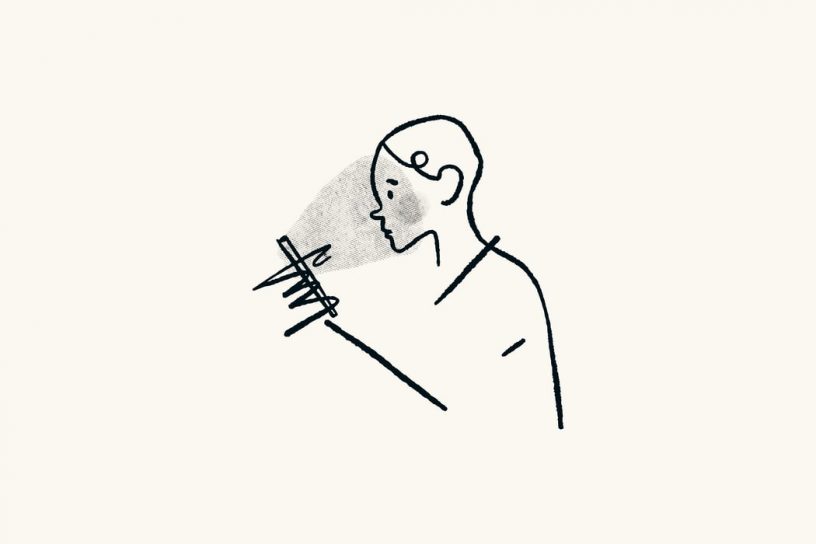Under Quarantine
For many who have had their lives upended by the COVID-19 pandemic, the world seems to be at a stand still. Schools have closed, businesses have closed, our own front doors have become a great barrier between ourselves and our many loved ones. And for those of us still who continue to work in now liminal spaces deemed essential to our communities, our days are shadowed by financial anxieties and the great risk of infection.
I have been finding it difficult to adjust to my new every day. My university courses have transitioned to remote instruction and, thankfully, my on-campus office position has followed suit. My second job at a small italian restaurant has reduced hours significantly and the majority of our staff — teenagers either completing or having just completed high school — remain home due to their and their families’ fears. Part of me wishes that I could do the same but I know that I could never afford it.
Overall, I and so many others feel overwhelmed by the great unknown. The fear of COVID-19 itself is only one part of the whole. I find myself more often afraid of losing my job and watching my savings dwindle away, or of failing my classes now that they are offered in a format that I have often avoided. I am most afraid of what my life will be like after the quarantine is lifted and after having spent several months struggling just to scrape by.
Yet, despite the heavy cloud of uncertainty that stretches over us all, I find myself drawn to those who are making the most of this unprecedented situation. I have witnessed so many of my friends, my family members, and my colleagues taking up new responsibilities and new hobbies, working to support themselves and their communities. I’ve noticed my neighbors trading essential supplies and homemade goods (in ways that adhere to social distancing guidelines and reduce the risk of infection) in order to ensure that every household has warm meals and a steady income of soaps and sewn masks. And I have also, perhaps most personally, noticed the innovations we are inclined to pursue when we must find new ways to connect with our loved ones.
One Day at a Time
I am not expecting each and every one of us to become great pioneers of communal giving. For one, not all of us may feel as if we have suitable resources to give or unique vocational skills that may help support a community. For another, many of us are likely strung up by our financial boot straps, and cannot fathom having a few coins to spare. It is alright to feel as though we cannot make a “big step”. Instead, it is important to make sure that we are taking smaller, more personal steps to ensure that we are supporting and caring for ourselves in the best ways that we can.
This practice will likely begin with restructuring a sense of stability into our new everyday life.
Whether we continue to work in a remote position, an essential position, or not, our schedules and routines have likely changed dramatically — and change is a difficult, often daunting concept. Regardless of the changes we have witnessed in our everyday lives, it is important that we imitate our trusted routines as well as we are able. If we are accustomed to rising early in order to beat the heaviest commutes, then we should continue to set our alarms for an early day. If we prepare ourselves for the tasks ahead with a warm cup of coffee and a pastry breakfast, then we should treat ourselves to the same at home. This observance of daily practices should follow us throughout each day, applying to the meals that we eat, how much time we allow ourselves to spend sitting vigil at our computers, which days we decide to enact our workout routines, the time in which we eventually lay down to sleep, etc. Keeping up with these small, daily rituals is essential to maintaining some sense of normality. We know, logically, that our situations are not normal, but it will do us no good to be bogged down by our own uncertainty and helplessness.
Change, especially that which we have not enacted ourselves and has instead been enacted upon us, can do a great number on our motivation and sense of purpose. The drive to maintain familiarity by imitating our usual routines will challenge such negative effects — we must, however, be sure to observe this practice throughout our time in quarantine. We may see our days stretching out before us and develop the urge to crawl away, slip into bed, intimidated or depressed by the lack of excitement or the lack of difference or the blatant unknown. But despite how we may feel, life is still happening around us, and it would be a great shame to miss out on what all it has to offer by falling into a great pit of despair.
Coping with Change
I worry that I make it sound like I believe this task to be easy. Although I have never dealt with a crisis such as this — a global pandemic being a unique historical event, to say the very least — I have lived a life with Depression and Anxiety as familiar companions. This pandemic, unsurprisingly, has done a great deal of damage to the life that I have built and to the coping strategies I have enacted daily for several years. Despite what I have learned and despite how well I have come to manage my own symptoms, I find myself fighting a battle each day to find the motivation that will pull me out of bed, make sure I care for myself, and make sure that my academic and professional responsibilities are not neglected.
Perhaps I shouldn’t mention my own difficulties, as the mentally ill in our country are still surrounded by rampant social stigmas, but I have a feeling the great majority of our communities are experiencing new and awful feelings that they are not accustomed to and would benefit from knowing they are not alone.
It is not strange if you find yourself turning away from activities you would otherwise enjoy. It is not strange if you find yourself listening to others describe how they have taken up all of these new hobbies and activities and find yourself unable to do the same. The reaction to this crisis will be unique for every person who lives through it.
There are, thankfully, ways in which we can challenge these negative responses. Aside from that which we have already implemented — a daily schedule and routine which imitates our usual, non-pandemic-stricken lives —it is important to maintain social relationships. We cannot go out to the bar or our favourite local restaurant, and we cannot wander through stores for the sake of it or invite our friends to spend time within our homes, but this does not mean we are without company. As I mentioned before, this crisis has bred innovation, and there are a multitude of ways for each and every one of us to connect. Video calls seem to be the most popular for all of us, as we are still able to see our loved ones, almost as if they are there with us. Video streaming sites also offer unique ways to get together, allowing movies and shows to be watched and games to be played with groups across large distances.
It is also important to remember that, although we cannot interact with others in public spaces as we used to, it is still vital that we take a few moments each day to step outside and take in the sun and fresh air. Bear in mind, of course, that this should be done in our own yards, respecting the safety of those who must venture further.
For a similar reason, it is also good to open our windows and air out our homes. It may not be quite as effective as stepping outside, but it is still a great deal kinder to our bodies than the alternative.
It is also a great idea to clean whenever you can muster the motivation. This may not be everyone’s favourite activity, but despite the basic pleasure of having a shiny and organized space afterwards, it is also much easier to cope with the moments in which you can not function as well as you would like when you do not have to worry about a physical mess around you. The less stress you can put on yourself at home, the easier you will find it to cope with your emotional difficulties.
In the worst case scenario, making sure that you have kept your home organized and tidy will also be a great benefit if you happen to contract an illness — you will know what medications you have on hand and where they are, you will know what food you have available, and if you find yourself in need of greater assistance, loved ones or emergency medical services will be able to navigate your home with ease.
In the end, it is important to remember that our priority throughout this dire situation should be protecting the health and well being of ourselves and others. Staying home is our main objective — it is the only proven and sure way to prevent the spread of COVID-19. Making sure that we are caring for ourselves emotionally, not only physically and financially, is also one of our most important (and perhaps most difficult) responsibilities.
Until we are able to meet again, I wish us all good health and safety.




